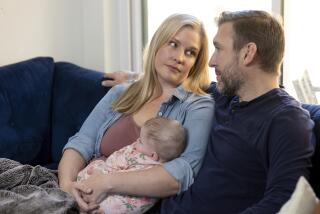Abortion Law Split Imperils German Talks : Reunification: In the East, the procedure is available on demand early in pregnancy. Bonn applies restrictions.
- Share via
WEST BERLIN — Differences on the sensitive issue of abortion law in united Germany threatened Monday to torpedo negotiations on a treaty setting out the political conditions for unification, which is scheduled for Oct. 3.
Because any agreement at this stage is likely to be only temporary, these differences, mainly in West Germany, mean that abortion will almost certainly be one of the hotly debated moral issues in the post-unity years.
Other differences are still to be resolved in the treaty talks, but the abortion issue is the most problematic, according to some of the people involved.
After a marathon session broke up early Monday, leaders of the major West German parties agreed to meet again today. They hope to complete the negotiations by the end of the week.
The problem centers on how to reconcile East Germany’s liberal law, under which abortion is provided on demand in the first 12 weeks of pregnancy, with the West German law, which permits abortions only on limited social and medical grounds.
All parties agree that both laws should remain in force, at least for a time, but they disagree sharply on how.
West German Chancellor Helmut Kohl’s Christian Democrats, under the influence of the Protestant and Roman Catholic churches, wants the law applied on the basis of a woman’s legal residence, and many West German women believe this to be highly discriminatory.
They say that a woman in Hamburg, in what is now West Germany, who went to Dresden, in what is now East Germany, for an abortion could be subject to criminal prosecution when she got home, although a woman living in Dresden could have an abortion legally.
Christian Democrats admit that there are contradictions in their stand but argue that any other compromise would dilute the strength of the law as it applies in what is now West Germany.
West German Social Democrats, who are the main opposition party, take a harsh view of the Christian Democratic position.
The Social Democrats propose that both laws continue to stand in the regions where they now apply, regardless of where an abortion patient lives.
“This is what the majority of women want, it is what the majority in the (West German) Bundestag want, it is what a majority in the (East German) Volkskammer want,” said Oskar Lafontaine, the Social Democrats’ candidate for chancellor.
The Social Democrats have said they will veto the unity treaty if Kohl insists on including the residence rule.
The Christian Democrats have drawn no such line.
Failure to approve the treaty would not stop unification, but it would make the process messy. Instead of a formal, bilateral accord on the conditions for merger, there would be a hastily drawn West German law on such matters as finance, education and property.
Such a bill would need only a simple majority, but it would add to the impression that the unification process has become more of a West German takeover.
The East Germans want to keep their liberal abortion law.
There is widespread agreement that a united Germany needs a complete overhaul of the abortion legislation.
In East Germany, abortion on demand has become commonplace, but the question of health risk has been raised. About 73,000 abortions were performed last year, in a country of 16 million people.
In West Germany, a country with four times as many people, the number of legal abortions was roughly the same.
More to Read
Sign up for Essential California
The most important California stories and recommendations in your inbox every morning.
You may occasionally receive promotional content from the Los Angeles Times.












